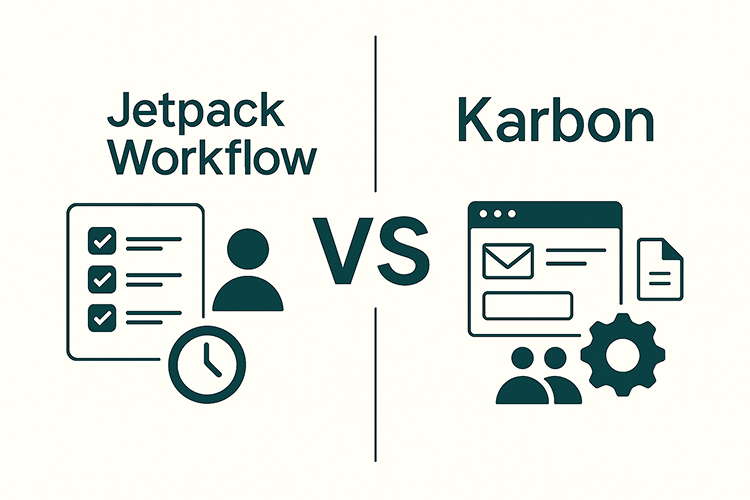When it comes to practice management, most accounting firms are looking for the same things: a clear view of deadlines, smoother client communication, and fewer admin headaches. Both Jetpack Workflow and Karbon are built with accountants in mind, but they take very different approaches. In this blog, we’ll walk through the key differences so you can decide which one fits your firm’s size, workflow, and growth goals.
Client Management
It’s worth clarifying what we mean by client management. In practice management software, it’s not about bookkeeping or CRM-style lead tracking—it’s about day-to-day collaboration. Think: sending requests, tracking responses, sharing files, and keeping communication tied to the actual work.
Karbon offers a full client portal where clients can upload documents, approve items, sign forms, and track progress. All of this links directly to the jobs your team is working on.
Jetpack Workflow is more internally focused. It helps your team stay on top of recurring jobs and deadlines, but it doesn’t come with a built-in client portal. Firms using Jetpack often keep a separate system for file sharing and e-signatures.
Workflow & task management
Karbon
- Tightly integrates email with workflow, so emails can instantly become tasks.
- Comes with a large library of accounting-specific templates.
- Supports automation to cut down on manual reminders and assignments.
Jetpack Workflow
- Known for its simple job and checklist setup.
- Provides ready-to-use templates (like payroll, bookkeeping, and tax prep) that you can adapt to your firm.
- Recently added task dependencies and history tracking to improve handoffs.
In short: Karbon is heavier on email and collaboration features, while Jetpack focuses on keeping recurring jobs consistent and easy to track.
Time tracking & billing
Karbon has time tracking, budgets, and billing built in. Teams can log time directly and compare estimates vs. actuals, with invoicing included.
Jetpack Workflow also lets you track time (manual or with timers) and review profitability, but it doesn’t manage invoicing itself. Instead, it connects with QuickBooks Online and other tools for that.
Client collaboration & signatures
Karbon makes client collaboration a core feature with its portal, requests, and e-signatures all included.
Jetpack Workflow doesn’t promote a client portal as part of the product. Most firms use it alongside tools like DocuSign or other portals to cover that gap.
Integrations
Karbon connects with a wide range of tools, including major accounting platforms, email, payment systems, and file storage.
Jetpack Workflow has an official QuickBooks Online integration and connects to many other apps through Zapier.
Pricing
Karbon (per user/month, billed annually):
- Starter – $59: Includes email integration, task management, client portal, time tracking, budgets, billing, and basic reporting.
- Business – $89: Adds workflow automation, advanced capacity planning, and more reporting tools.
- Enterprise – Custom: Tailored pricing for firms that need extra security and advanced support.
Jetpack Workflow:
- $30 per user/month (annual) or $45 per user/month (monthly). Includes all features plus onboarding and support. One plan keeps things simple.
Things to note:
- Jetpack is cheaper and easier to budget for.
- Karbon looks pricier, but since it bundles in client portals and billing, it may reduce your spend on separate tools.
Usability & adoption
Jetpack Workflow is designed to be quick to roll out. With its simple structure and ready-made templates, most small firms can start using it in a matter of days. It’s especially appealing if you want to keep things lightweight.
Karbon requires more setup time upfront. Importing email, building workflows, and configuring automation can take longer, sometimes weeks, but the payoff is stronger once your team adjusts. Staff usually see the value quickly once they realize client requests, email, and tasks are all in one place.
Which firms they suit best
Jetpack Workflow: Ideal for solo accountants or smaller teams who want an affordable, straightforward system to manage recurring work. It works best if you’re fine keeping your existing portal or e-sign setup.
Karbon: A better fit for growing firms that need everything—email, workflow, and client collaboration—under one roof. Its automation and reporting features also shine as you scale.
Conclusion
Both Jetpack Workflow and Karbon are built with accountants in mind, but they serve different needs. If you want a lean tool that’s quick to adopt and light on cost, Jetpack is a smart choice. If you’re thinking longer-term and want to consolidate client communication, requests, and workflows into one system, Karbon is likely to save you time and reduce risk as your firm grows.


